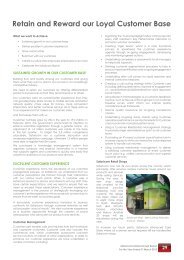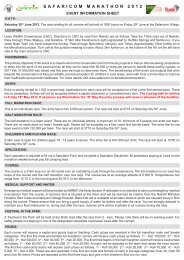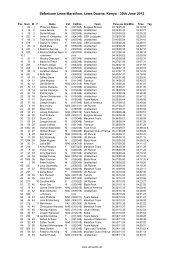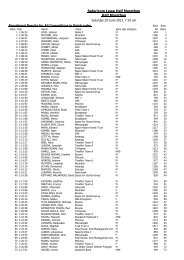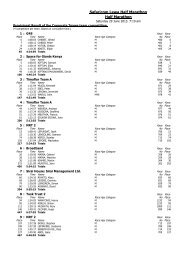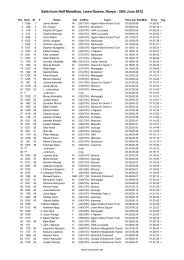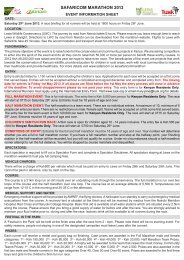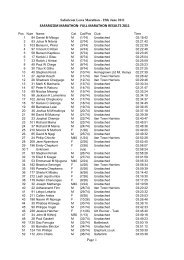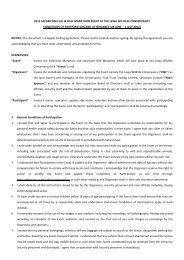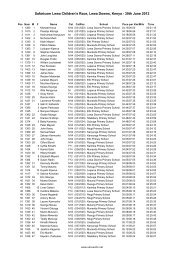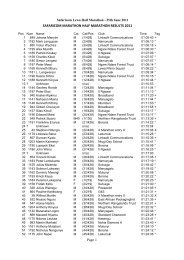Sustainability Performance: At a glance (31 March 2012) - Safaricom
Sustainability Performance: At a glance (31 March 2012) - Safaricom
Sustainability Performance: At a glance (31 March 2012) - Safaricom
Create successful ePaper yourself
Turn your PDF publications into a flip-book with our unique Google optimized e-Paper software.
Dynamic regulatory environment<br />
<strong>Safaricom</strong> operates in a<br />
dynamic regulatory environment<br />
that requires it to ensure<br />
full compliance with licence<br />
conditions, regulations, bylaws<br />
and changes to governing<br />
legislation. Failure to meet<br />
prescribed compliance levels will<br />
expose <strong>Safaricom</strong> to penalties<br />
and other remedial sanctions<br />
from sector regulators.<br />
R1<br />
Dynamic<br />
regulatory<br />
environment<br />
Some of the risks associated with this<br />
category include:<br />
• Risk of non-compliance with<br />
regulatory requirements<br />
Apart from the conditions set out in<br />
<strong>Safaricom</strong>’s operating licence, <strong>Safaricom</strong><br />
is required to comply with the provisions<br />
of various Acts of Parliament and<br />
the Regulations, such as the Kenya<br />
Information and Communications Act<br />
(KICA), Environmental Management<br />
and Coordination Act (EMCA), Capital<br />
Markets Authority (CMA) and the Kenya<br />
Civil Aviation Act (KCAA). Adherence to<br />
Local Authority by-laws and guidelines,<br />
as well as Codes of Practice developed<br />
by Regulators is also mandatory. Failure<br />
to comply with any of these regulatory<br />
requirements would expose <strong>Safaricom</strong><br />
to non-compliance penalties and other<br />
unfavourable regulatory interventions.<br />
<strong>Safaricom</strong>’s compliance with regulatory<br />
requirements remains very high.<br />
<strong>Safaricom</strong> files Quarterly Returns with<br />
the Communications Commission<br />
of Kenya (CCK) on a wide range of<br />
parameters, including service levels,<br />
customer management and usage of<br />
spectrum resources. <strong>Safaricom</strong> will<br />
continue to ensure compliance with all<br />
regulatory and licence requirements,<br />
while ensuring engagement with industry<br />
regulators on issues that affect<br />
our operations.<br />
• Changing legislation and regulations<br />
relating to mobile money transfer<br />
Legislation and regulatory requirements<br />
governing mobile money transfers<br />
are evolving alongside changes in the<br />
Kenyan telecommunications sector.<br />
More specifically, the financial services<br />
provided by <strong>Safaricom</strong> through M-PESA<br />
are likely to attract regulation, creating<br />
additional compliance requirements.<br />
Any significant changes to existing<br />
regulatory environment may present a<br />
risk to mobile money transfer<br />
services. <strong>Safaricom</strong> is,<br />
however, engaging proactively<br />
with the Central Bank and other<br />
stakeholders to ensure that any<br />
regulations passed continue to<br />
promote the growth of mobile<br />
money transfer and to deepen<br />
financial inclusion.<br />
• Increasing regulatory fees<br />
Fees paid to regulators (such as<br />
licence fees, spectrum charges,<br />
compliance charges, local<br />
authority payments) remain a<br />
significant cost to <strong>Safaricom</strong> and<br />
amount to approximately 4% of<br />
revenues. Failure to pay these<br />
fees would expose <strong>Safaricom</strong><br />
to penalties and compromise<br />
our ability to operate and deliver<br />
services to customers.<br />
• <strong>Safaricom</strong>’s perceived<br />
dominance in the market<br />
Owing to our market share,<br />
<strong>Safaricom</strong> is anecdotally<br />
perceived as being dominant<br />
— although no official finding in<br />
this regard has been made at<br />
this time. If <strong>Safaricom</strong> is found to<br />
be dominant in certain markets,<br />
the company will be subject to<br />
additional regulatory scrutiny and<br />
obligations.<br />
Competition Law in Kenya<br />
provides that an entity in a<br />
dominant position does not<br />
automatically attract regulatory<br />
sanction unless it is found to be<br />
abusing its dominant position<br />
in the market, in which case, a<br />
heavy penalty of up to 10% of<br />
revenues may be imposed.<br />
In keeping with Competition<br />
Law provisions, <strong>Safaricom</strong> has<br />
ensured that its operations<br />
and actions in the market are<br />
Dynamic regulatory environment<br />
in compliance with the law and has<br />
engaged in competition with other<br />
operators using superior product<br />
offerings, customer management, quality<br />
of service and a strong brand as key<br />
differentiators.<br />
• Development of Long Term Evolution<br />
(LTE) in the Kenyan market<br />
Long Term Evolution (LTE) is currently<br />
being discussed by Government<br />
as a way to offer more broadband<br />
capacity in the telecommunications<br />
market. Accordingly, <strong>Safaricom</strong> has<br />
to ensure that it is ready to offer these<br />
services from both a technological<br />
and infrastructural perspective in<br />
order to remain competitive in the<br />
telecommunications industry.<br />
Long Term Evolution<br />
Long Term Evolution (LTE) is a Fourth<br />
Generation wireless broadband<br />
technology. It is an easily deployable<br />
network technology, which offers high<br />
speeds and low latencies over long<br />
distances.<br />
Our approach<br />
For all of the risks identified, <strong>Safaricom</strong>’s<br />
strategy to mitigate or manage them includes:<br />
• Proactively ensuring compliance<br />
with licence obligations, legislation,<br />
regulations, by-laws and regulator<br />
guidelines.<br />
• Actively engaging with regulators<br />
through face-to-face meetings, written<br />
submissions and memoranda when<br />
changes to the existing environment are<br />
under discussion.<br />
• Facilitating workshops and information<br />
sessions with regulators, members of<br />
the media and affected stakeholders to<br />
discuss public policy issues.<br />
• <strong>At</strong>tending stakeholder workshops and<br />
lobbying on behalf of the industry.<br />
52 <strong>Safaricom</strong> <strong>Sustainability</strong> Report <strong>2012</strong><br />
<strong>Safaricom</strong> <strong>Sustainability</strong> Report <strong>2012</strong> 53



